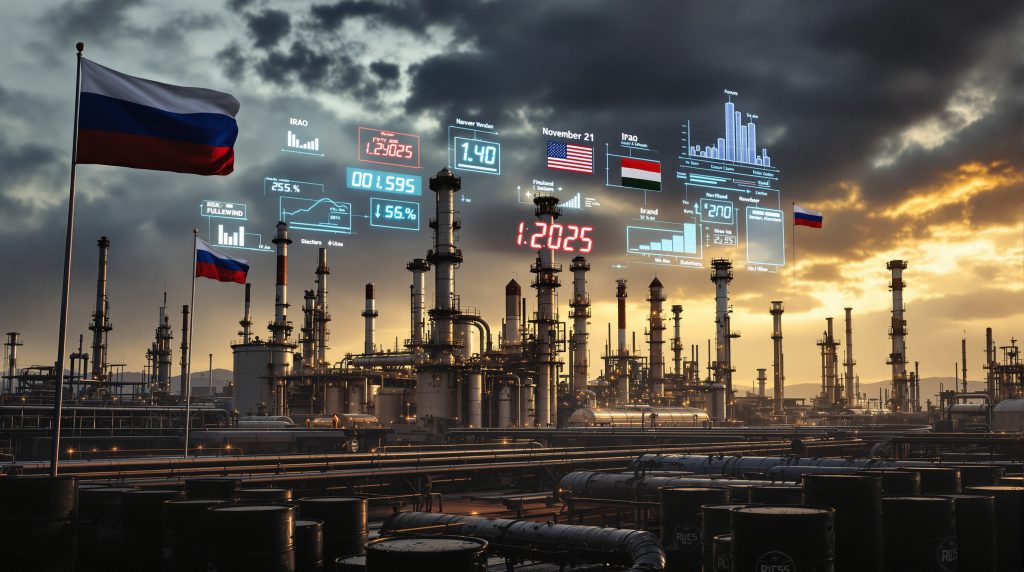Understanding the November 21, 2025 Compliance Cutoff
The November 21, 2025 deadline marks a watershed moment for global energy markets, establishing the final date when all international companies must completely terminate business relationships with Lukoil PJSC. This Treasury-mandated compliance cutoff follows comprehensive sanctions imposed in October 2025, targeting Russia's second-largest oil producer and creating unprecedented challenges across petroleum supply networks worldwide.
The urgency surrounding this Lukoil U.S. sanctions deadline stems from the company's massive international footprint, encompassing oil fields, refineries, and fuel distribution networks across multiple continents. Energy market analysts indicate that while global crude oil markets maintain adequate buffer capacity to manage potential disruptions, the refining sector faces significantly more complex challenges in adapting to this forced transition.
Industry experts note that the compressed timeline between sanctions announcement and the compliance deadline has intensified pressure on governments and corporations to develop rapid asset management solutions. Furthermore, the situation became particularly acute following the collapse of a proposed acquisition deal that initially appeared to offer a comprehensive solution for maintaining operational continuity.
How Did U.S. Sanctions Target Lukoil's Global Operations?
The October 2025 sanctions framework represents one of the most comprehensive restrictions ever applied to a single Russian energy entity. The U.S. Office of Foreign Assets Control implemented sweeping measures targeting Lukoil's extensive international operations, which span upstream production, midstream processing, and downstream retail distribution across numerous countries.
Coordinated International Enforcement
- Simultaneous sanctions implementation by both United States and United Kingdom authorities
- Targeting of Lukoil's vast network including oil fields, refineries, and filling stations
- Creation of unified Western pressure on Russian energy operations
- Establishment of brief transition window until November 21, 2025
The sanctions architecture specifically focuses on disrupting Lukoil's ability to maintain international business relationships while forcing rapid restructuring of supply chains that have operated for decades. This approach differs from previous energy sanctions by targeting both direct operations and indirect business partnerships simultaneously.
In addition, the coordinated timing between U.S. and UK authorities amplified the restrictions' effectiveness, creating a unified regulatory environment that eliminates potential jurisdictional gaps. This broader context of Trump tariffs impact on global markets demonstrates how trade policy instruments can reshape international business relationships.
Which Countries Are Racing to Secure Lukoil Assets?
Multiple governments across Europe and the Middle East have initiated emergency procedures to maintain operational continuity at critical energy infrastructure previously managed by Lukoil. These interventions represent unprecedented government involvement in private energy operations, driven by concerns about supply security and economic stability.
Bulgaria's Strategic Refinery Intervention
Bulgarian authorities moved decisively to assume control of the country's largest refinery, prioritising employment protection and domestic fuel security over traditional privatisation processes. This government takeover represents a significant departure from standard European Union approaches to energy asset management, reflecting the extraordinary circumstances created by the sanctions timeline.
The Bulgarian intervention demonstrates how the Lukoil U.S. sanctions deadline has forced European governments to balance adherence to sanctions compliance with maintaining essential energy infrastructure operations. This scenario reflects broader challenges similar to US tariffs and inflation concerns affecting global economic stability.
Finland's Supply Chain Crisis Response
Finnish fuel distribution networks experienced immediate operational challenges when Lukoil-owned companies ceased deliveries, resulting in fuel shortages at multiple filling stations across the country. Local media reports indicate that the disruptions affected consumer access to gasoline and diesel, prompting government agencies to develop alternative supply arrangements.
The Finnish situation illustrates the downstream consequences of the sanctions, where retail consumers experience direct impacts despite the primary targeting of corporate-level business relationships.
Iraqi Oil Field Operational Continuity
Perhaps the most significant operational disruption occurred in Iraq, where Lukoil declared force majeure at an oil field responsible for approximately 10% of Iraq's total crude production. Two Iraqi state companies rapidly assumed operational control to prevent production shutdowns that could have affected global oil markets.
The Iraqi intervention demonstrates the critical importance of maintaining production continuity at strategically significant oil assets, even when ownership transitions occur under compressed timelines.
This production represents a substantial portion of Iraq's output, highlighting the scale of assets affected by the sanctions and the potential for broader market implications if operational continuity had not been maintained. These disruptions contribute to the wider commodity market volatility affecting global energy trading.
What Happened to the Failed Gunvor Acquisition Deal?
The proposed acquisition by Gunvor Group initially offered what appeared to be a comprehensive solution for managing Lukoil's international assets while satisfying sanctions requirements. Energy trading giant Gunvor had negotiated agreements to acquire the Russian company's overseas operations, providing a pathway for maintaining operational continuity across affected facilities.
Treasury Department Rejection and Market Impact
The deal collapsed dramatically when the U.S. Treasury Department characterised Gunvor as a "Kremlin puppet," effectively terminating the transaction and eliminating what industry participants viewed as the most viable solution for asset preservation. The rejection occurred on November 6, 2025, just days before this analysis, intensifying urgency around alternative management strategies.
Consequences of Deal Collapse
- Immediate withdrawal of Gunvor from the proposed transaction
- Acceleration of government intervention efforts across multiple countries
- Increased uncertainty for thousands of employees at affected facilities
- Elimination of private-sector solution for comprehensive asset management
The failed Gunvor deal exemplifies the complex regulatory environment surrounding the Lukoil U.S. sanctions deadline, where proposed solutions must navigate not only commercial viability but also political acceptability to enforcement authorities.
However, industry analysts note that the Treasury Department's rejection highlighted the challenges facing any private entity seeking to acquire sanctioned Russian assets, regardless of the proposed transaction structure or operational benefits.
How Are Global Energy Markets Responding to the Deadline?
Global energy markets have demonstrated differential responses across various sectors, with crude oil markets showing greater resilience compared to refining operations. Market analysis indicates that while upstream production has adequate buffer capacity to absorb potential supply disruptions, downstream operations face more significant challenges in adapting to forced supply chain modifications.
Market Resilience Assessment by Sector
| Market Segment | Resilience Level | Primary Risk Factors |
|---|---|---|
| Crude Oil Production | High | Global spare capacity available |
| Petroleum Refining | Moderate | Specialised infrastructure constraints |
| Retail Distribution | Low | Limited alternative supplier networks |
| Transportation Fuels | Variable | Regional supply chain dependencies |
Supply Chain Buffer Analysis
The differentiated market response reflects fundamental structural differences between crude oil markets, which maintain strategic reserves and alternative suppliers, versus refining operations that rely on specific crude grades and established processing relationships. These dynamics interact with broader concerns about OPEC's market influence and US oil production challenges affecting global energy balance.
Energy market experts emphasise that crude oil markets possess sufficient flexibility to redirect supply flows and maintain global balance, while refining operations face technical constraints related to processing specific crude oil types and maintaining established supply relationships.
Regional Market Variations
Different geographic markets have shown varying degrees of stress in response to the approaching Lukoil U.S. sanctions deadline:
- European markets: Significant disruption in retail fuel distribution
- Middle Eastern operations: Focus on maintaining production continuity
- Global crude trading: Relatively stable with alternative supply sources
- Specialised refining: Higher vulnerability due to crude grade specifications
What Are the Immediate Consequences of Non-Compliance?
Companies failing to terminate all business relationships with Lukoil by the November 21, 2025 deadline face severe financial and operational penalties under U.S. sanctions law. The enforcement framework includes both primary sanctions targeting direct relationships and secondary sanctions affecting entities that continue indirect business connections.
Primary Sanctions Enforcement Mechanisms
Non-compliant organisations face immediate exclusion from U.S. financial systems, effectively eliminating access to dollar-denominated transactions and American markets. This prohibition extends to subsidiaries, joint ventures, and affiliated entities that maintain sanctioned relationships beyond the compliance deadline.
Secondary Sanctions Risk Framework
The Treasury Department has indicated that secondary sanctions may apply to third parties continuing business relationships with non-compliant entities, creating compliance pressure throughout international supply chains. This expanded enforcement approach significantly increases the potential scope of penalties beyond direct Lukoil business partners.
Financial System Access Restrictions
- Prohibition from U.S. banking system participation
- Elimination of dollar-denominated transaction capability
- Restriction from American capital markets
- Potential freezing of U.S.-held assets
- Limited access to international correspondent banking relationships
Consequently, the enforcement structure creates cascading effects throughout global financial networks, where maintaining relationships with sanctioned entities can result in broader financial system exclusion.
Which Industries Face the Greatest Disruption?
The impact of the Lukoil U.S. sanctions deadline varies significantly across different energy industry segments, with refining operations experiencing the most severe operational challenges. The sector-specific vulnerabilities reflect fundamental differences in operational flexibility, infrastructure requirements, and alternative supplier availability.
Petroleum Refining Sector Vulnerability
Refineries face the most complex adaptation challenges due to their specialised infrastructure and established crude oil processing relationships. Unlike crude oil markets that maintain flexibility in sourcing, refining operations often depend on specific crude grades that match their processing configurations and product output requirements.
The technical constraints of refining operations create particular vulnerability when established supply relationships must be terminated rapidly. For instance, refineries optimised for processing specific crude oil types may require significant operational modifications or accept reduced efficiency when transitioning to alternative feedstocks.
Transportation Fuel Distribution Networks
Retail fuel distribution represents another highly vulnerable sector, particularly in regions where Lukoil maintained significant market presence. The Finnish experience demonstrates how quickly consumer-facing disruptions can occur when established distribution relationships are severed.
Industry Impact Hierarchy
- Petroleum Refining: Highest vulnerability due to infrastructure specialisation
- Retail Fuel Distribution: Immediate consumer impact potential
- Petrochemical Manufacturing: Feedstock supply disruption risks
- Transportation Services: Fuel availability concerns
- Industrial Energy Users: Alternative supplier transition requirements
Regional Concentration Effects
The impact intensity varies significantly by geographic region, with Eastern European and some Middle Eastern markets experiencing disproportionate disruption due to historical business relationships with Lukoil operations.
How Can Companies Ensure Sanctions Compliance?
Organisations seeking to meet the Lukoil U.S. sanctions deadline must implement comprehensive compliance programmes that address both direct business relationships and indirect connections through subsidiaries, contractors, and business partners. The complexity of modern energy supply chains requires systematic approaches to identifying and terminating all potentially sanctioned relationships.
Comprehensive Due Diligence Requirements
Companies must conduct thorough reviews of all business relationships, including joint ventures, service contracts, supply agreements, and financial arrangements that might create direct or indirect connections to Lukoil operations. This due diligence extends to subsidiaries, affiliates, and third-party contractors that might maintain independent relationships with sanctioned entities.
Documentation and Compliance Recording
Maintaining detailed records of compliance efforts provides essential protection against potential enforcement actions. Organisations should document:
- Comprehensive relationship mapping and termination notices
- Alternative supplier identification and qualification processes
- Legal review procedures and compliance certifications
- Employee training programmes and awareness initiatives
- Ongoing monitoring systems for detecting prohibited relationships
Legal Consultation and Licensing Options
Specialised sanctions attorneys can provide guidance on complex regulatory requirements and help evaluate potential licensing opportunities for essential operations. While Treasury Department licenses remain available for limited circumstances, approval criteria focus primarily on humanitarian needs or critical infrastructure maintenance.
Technology-Enabled Compliance Solutions
Modern compliance programmes increasingly rely on technology solutions for monitoring supply chain relationships, screening business partners, and maintaining ongoing surveillance for prohibited connections. These systems help organisations manage the complexity of global business networks while ensuring continued adherence to sanctions requirements.
What Long-Term Market Changes Should Investors Expect?
The Lukoil U.S. sanctions deadline represents a catalyst for fundamental restructuring of international energy relationships, with implications extending far beyond the immediate compliance requirements. Investors should anticipate both challenges and opportunities as markets adapt to permanently altered supply chain configurations.
Energy Supply Chain Restructuring Opportunities
The forced termination of Lukoil relationships accelerates existing trends toward supply chain diversification and reduced dependence on Russian energy sources. This restructuring creates opportunities for alternative suppliers to establish new long-term relationships with refineries, distributors, and industrial consumers previously served by Lukoil operations.
Regional Market Consolidation Trends
Smaller regional energy companies may benefit significantly from reduced competition as Lukoil exits key markets. The removal of a major competitor can improve pricing dynamics and market share opportunities for remaining operators, particularly in retail fuel distribution and specialised refining segments.
Investment Flow Redirection Patterns
Capital previously allocated to Russian energy partnerships will likely redirect toward Western and Middle Eastern energy projects, influencing global investment patterns and potentially improving returns for non-sanctioned energy infrastructure development.
Strategic Investment Considerations
- Alternative supplier capacity: Companies expanding to serve former Lukoil customers
- Infrastructure development: New refining and distribution capacity in affected regions
- Technology solutions: Compliance and supply chain management systems
- Regional consolidation: Market share gains by remaining competitors
- Energy security investments: Government-backed strategic reserve and infrastructure projects
Frequently Asked Questions About the Lukoil Sanctions Deadline
Can Companies Request Licenses to Continue Operations?
The U.S. Treasury may consider specific licenses for essential services, but approval criteria remain stringent and focused on humanitarian needs or critical infrastructure requirements. Most commercial relationships will not qualify for licensing exceptions.
What Happens to Existing Contracts After November 21?
All contractual obligations with Lukoil become unenforceable under U.S. law after the compliance deadline, regardless of termination clauses, penalty provisions, or force majeure protections included in original agreements.
Are There Exceptions for Humanitarian Purposes?
Limited exceptions may apply for medical supplies, emergency services, or critical infrastructure maintenance, but companies must obtain explicit Treasury Department approval before proceeding with any potentially sanctioned activities.
How Do Secondary Sanctions Affect Business Partners?
Third parties maintaining business relationships with entities that fail to comply with the Lukoil sanctions may themselves face secondary sanctions, creating compliance obligations throughout extended business networks.
What Documentation Should Companies Maintain?
Organisations should preserve comprehensive records of compliance efforts, including termination notices, alternative supplier agreements, legal consultations, and ongoing monitoring activities to demonstrate good faith compliance efforts.
Strategic Implications for Global Energy Security
The Lukoil U.S. sanctions deadline extends beyond regulatory compliance to represent a fundamental shift in international energy security architecture. The successful navigation of this transition by energy companies, governments, and consumers will establish precedents for managing future geopolitical disruptions to global energy systems.
Geopolitical Energy Fragmentation
The sanctions demonstrate accelerating fragmentation of global energy markets along geopolitical lines, with Western and Russian energy systems becoming increasingly separated. This trend suggests continued challenges for companies seeking to maintain global operations while navigating complex sanctions environments.
Resilience and Adaptation Strategies
Organisations that successfully adapt to the Lukoil sanctions deadline while maintaining operational continuity will emerge with strengthened competitive positions and enhanced resilience to future geopolitical disruptions. The experience gained in rapid supply chain restructuring provides valuable capabilities for managing similar future challenges.
Market Structure Evolution
The permanent removal of Lukoil from international markets creates lasting changes in competitive dynamics, pricing structures, and investment flows that will influence energy sector development for years beyond the immediate compliance deadline.
Regulatory Precedent Setting
The comprehensive nature of the Lukoil sanctions and the compressed compliance timeline establish important precedents for future sanctions implementation, suggesting that similar restrictions on other major energy entities could follow comparable enforcement patterns.
The energy sector's response to the November 21, 2025 compliance deadline will provide valuable insights into the resilience of global energy systems and the effectiveness of economic sanctions as tools of international policy. Companies, investors, and policymakers will study this transition for lessons applicable to future energy security challenges in an increasingly complex geopolitical environment.
Disclaimer: This analysis is based on publicly available information as of November 2025. Energy market conditions, sanctions requirements, and compliance procedures may change rapidly. Companies should consult with qualified legal and compliance professionals before making business decisions related to sanctions compliance.
Looking to Navigate Energy Market Disruptions?
Discovery Alert's proprietary Discovery IQ model identifies emerging opportunities in energy and resource sectors as markets shift around major geopolitical events like the Lukoil sanctions deadline. Subscribers gain immediate insights into how supply chain disruptions create new investment opportunities across commodity markets, helping traders and investors position themselves ahead of evolving market conditions. Begin your 30-day free trial today to access real-time alerts on significant ASX mineral discoveries and market-moving developments.




